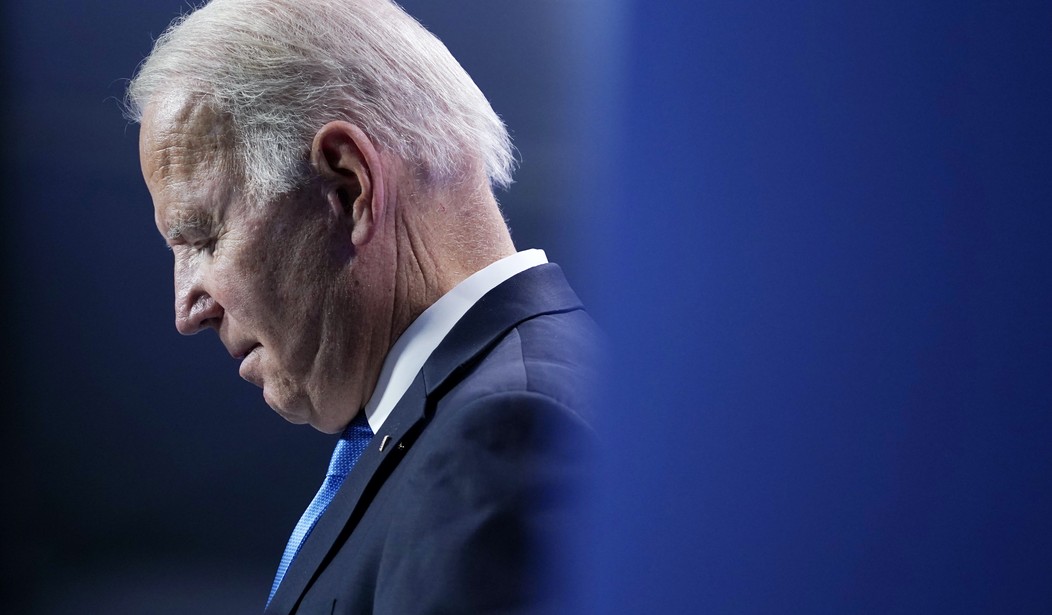President Joe Biden has united the American people -- in disapproving of his performance, with 70% of Americans disliking the direction the economy is going and over 6 in 10 blaming him for it. The impact of inflation on people's pocketbooks and concerns over the expanding role of government are important in explaining those low approval numbers. A good time to change course is now.
A recent Washington Post-ABC poll asked, "How concerned are you, if at all, that Biden will do too much to increase the size and role of government in U.S. society?" Some 59% said they were "very" or "somewhat" concerned, while 38% said they were "not so" or "not at all" concerned. I, for one, am glad Americans are noticing the Democrats' power grab.
Government's expansion didn't start with this administration, of course. Both parties are responsible for the continued growth of the size and scope of the federal government that began long before 2020. These parties also joined forces to spend as much as they could on everything related (or not related) to COVID-19 throughout the last year. But today's Democrats are ambitiously pushing the envelope by further enabling the federal takeover of child care, paid leave, energy and more.
While our previous experiences may lead us to believe that it's politically beneficial for legislators to line people's pockets, especially if voters believe someone else will pay for it, this strategy isn't working so well today. The recent surge in inflation prevents people from getting as much from the cash they received after the passage of $1.9 trillion in COVID-19 pandemic relief legislation. But whether this inflation is the product of our oversized COVID-19 fiscal response, the Federal Reserve's 36% increase in the money supply between February 2020 and September 2021, pandemic-related supply-chain bottlenecks or a mix of the three, it doesn't matter politically when people are hammered with higher prices at the grocery store and at the pump and their rent is going up, especially if their wages aren't keeping up.
Recommended
It also doesn't help that experts have been wrong about inflation. First, they claimed there would be no inflation. Then, when inflation inevitably came, they said it would be short-lived or transitory. When it persisted, the alleged reason was that prices were catching up to their pre-pandemic levels. Once experts finally admitted that some of the administration's policies may have fueled some of the demand for durable goods and withdrawal of workers from the labor force, which in turn exacerbated the supply-chain issues, we were told either that there was nothing that could be done or that the resulting inflation was the price we must pay for a strong labor market.
All or some of these factors may play a role in the current situation, but it doesn't inspire confidence that no one really knows how long the problem will last or how high prices will go.
So, where do we go from here? Ideally, supply-side reforms to lift housing and infrastructure building restrictions and occupational licensing requirements should be implemented. It starts with not throwing more fuel on the fire with the Build Back Better (BBB) plan pushed by the Democrats. While the administration claims the legislation will reduce inflation, Ben Ritz of the Progressive Policy Institute reminds us in The Wall Street Journal that "the 17 Nobel laureates who signed a much-touted letter saying BBB would 'reduce long-term inflationary pressure' did so at a time when they thought the bill would be fully paid for by higher taxes on the wealthy." That isn't true anymore, so this Nobel letter likely lost most of its predictive power.
BBB also will certainly have a negative impact on the labor supply thanks to its many disincentives to work and other regulations. That means high prices in these subsidized industries. Meanwhile, we shouldn't count on spending to stimulate the economy as unemployment is nearing pre-pandemic lows and the economy is already growing. According to the Wharton School's analysis, we should count on the BBB plan's real cost to be $4.26 trillion with $1.56 trillion deficit financed, not $1.75 trillion and paying for itself, once all budget gimmicks are taken under consideration.
By continuing with this legislation, Democrats are signaling that they would rather stoke the inflation flame so they can centralize more federal power even if they risk a painful intervention by the Federal Reserve. That will do little to assuage people's concern about government's growth.
























Join the conversation as a VIP Member